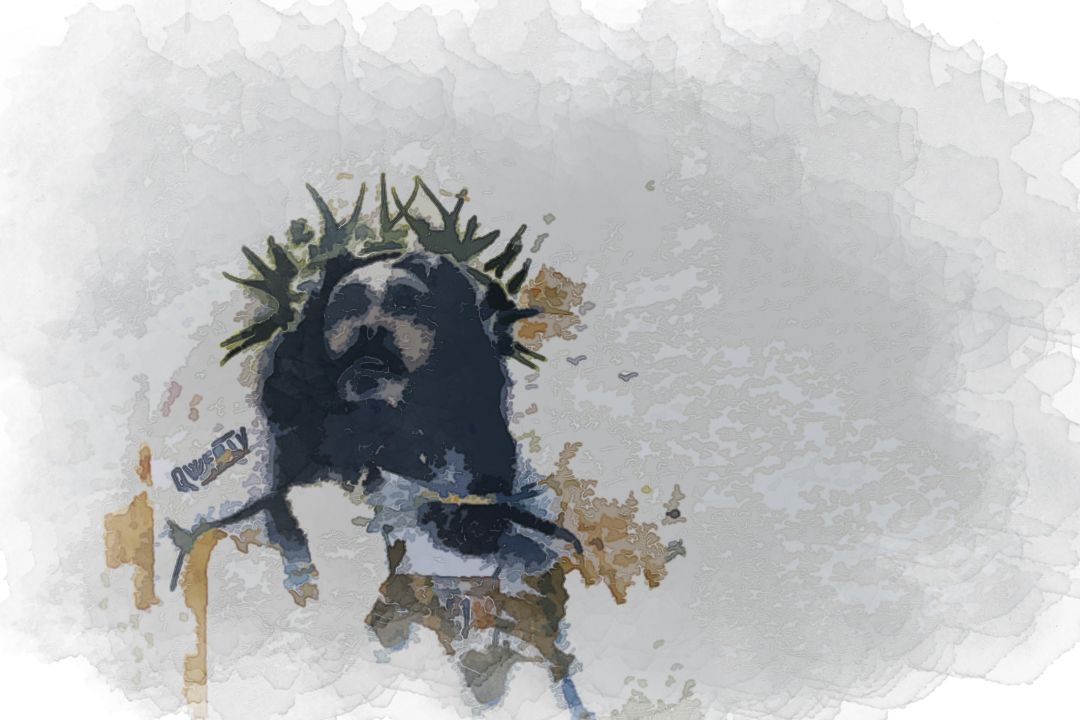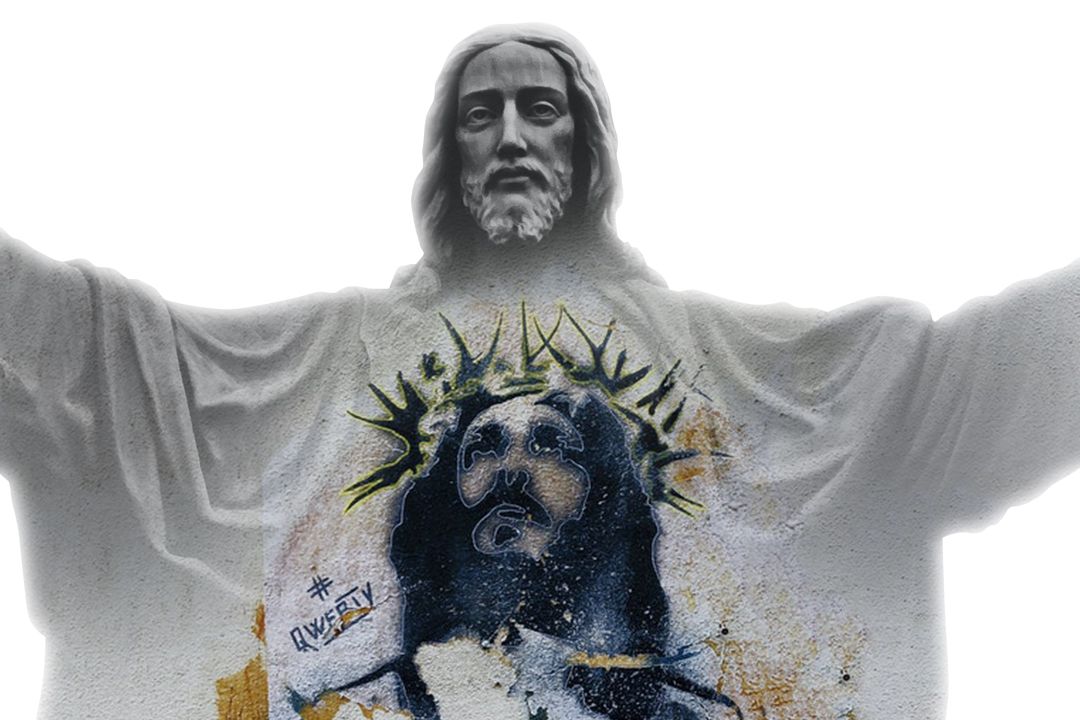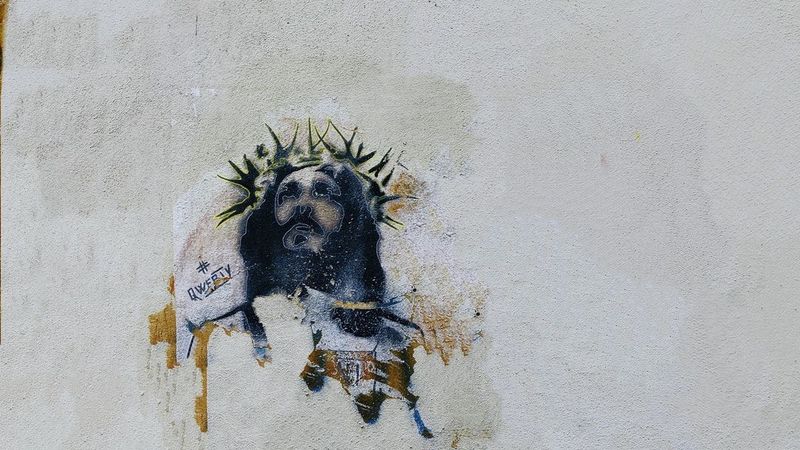Worry More!

The Pound Qwerty Jesus
In the heart of the metropolis, there was a peculiar sight that often drew the attention of passersby: a statue that the locals affectionately referred to as "The Pound Qwerty Jesus." Positioned in a quaint little plaza surrounded by towering buildings, the statue was a blend of solemnity and modern jest, a silent guardian watching over the city's ceaseless hustle.
Sophia, whose artistic endeavors were often seen as whispers of color against the city's monochromatic drone, had transformed the iconic statue into a canvas that spoke to the wandering souls of the city. Armed with her arsenal of spray paints, she rendered onto "The Pound Qwerty Jesus" a graffiti masterpiece that encapsulated a silent rebellion against the digital age's relentless pace.
Sophia believed in a particular kind of faith. It was not the kind that required grand gestures or loud proclamations; rather, it was a quiet understanding, a gentle acceptance of life's ebb and flow. As she sprayed the final touches onto the chest of the statue, she recalled a quote that had long resonated with her.
To me, faith means not worrying.
— John Dewey (1859-1952)
These words had become her mantra, a guiding principle in her life and her art. With every stroke of her can, she infused this belief into the stone, etching into the fabric of the city a reminder of the power of faith, the sort that lies in trusting the journey, regardless of the destination.
The citizens of the city, for their part, received this new addition to their daily landscape with a mixture of curiosity and admiration. Some would pause in their tracks, momentarily losing themselves in the message that now adorned the statue, finding a piece of themselves within the art. It was a silent dialogue between the viewer and the viewed, a shared moment of introspection amidst the cacophony of city life.
Among the many that passed by was Alexander, a man whose life had been measured out in deadlines and commitments, his days a blur of digital transactions and virtual connections. To him, the world had shrunk to the size of a screen, life distilled into binary simplicity.
But when Alexander's gaze fell upon the work of art that Sophia had created, something shifted within him. He read the quote, the words aligning with a long-forgotten piece of his own philosophy. A smile, unbidden and genuine, broke across his face. For the first time in what felt like eons, Alexander felt the weight of worry lift from his shoulders. In its place, a burgeoning sense of faith took root—one not tied to dogma or creed, but to the simple act of letting go.
Sophia's artwork, with its playful defiance and profound message, had become more than just an embellishment to the city. It was a testament to the beauty of unworried faith, a beacon for those lost in the digital wilderness. And for Alexander, it was the beginning of a new chapter, one where the hammering of keys gave way to the laughter in the streets, where faith meant not worrying, and living was more than just existing.
If the only tool you have is a hammer, you tend to see every problem as a nail.
— Gerard Manley Hopkins (1844-1889)
As the days passed, The Pound Qwerty Jesus stood as a silent observer to the lives unfolding around it. It had become more than just a statue; it was a mirror reflecting the innermost thoughts of those who paused to look. For Alexander, who had begun to make detours just to pass it on his way to work, it became a daily checkpoint, a place to remind himself of the newfound ease he carried in his heart.
Yet, there was something more to be learned from the playful juxtaposition of the sacred and the tagged, something about the tools we use to navigate our lives. On one particular evening, as the sky painted itself with the orange and purples of twilight, Alexander stopped once again before the statue. There, at the base, he noticed a new addition—a plaque bearing another quote, one that stirred the pools of his cognizance with a profound ripple.
“If the only tool you have is a hammer, you tend to see every problem as a nail.”
— Gerard Manley Hopkins (1844-1889)
It was a revelation so sharp, so poignant, that Alexander couldn't help but chuckle. He had been a man of singular approach: every task, a problem to solve; every challenge, a nail to be struck with the unyielding hammer of his expertise. His world had been one of absolutes, where the rhythm of his life was dictated by the relentless tapping of keys, the clatter of hammers on nails in the vast construction site of progress.
But here, in the presence of Sophia's art, he found himself questioning. Was it possible that he had been limiting his own potential by viewing the world through such a restrictive lens? Could it be that there were tools he had neglected, possibilities he had never allowed himself to consider?
With the gentle hum of the city as his soundtrack, Alexander imagined himself as a craftsman of life, his hands reaching out for new instruments. There was the brush for painting broad strokes of joy on the days that felt too dull, the wrench for tightening the bonds that held his relationships together, the screwdriver for adjusting his perspectives when they became too rigid.
Sophia, who occasionally observed from a distance the impact her work had on the denizens of the city, noticed the change in Alexander. She saw the way his eyes lingered on the quotes, the way his stance softened, and how his fingers traced the imaginary toolbox she had inspired. It brought a smile to her face, and a lightness to her heart. Her art had always been about communication, about reaching out across the void of human experience to touch someone else's soul.
The Pound Qwerty Jesus, a playful planksip Möbius worth talking about, had indeed started a conversation. For Alexander, the dialogue was with his own soul, a whimsical yet profound interrogation of his own truths. The statue, a once unyielding figure of faith, had become a harbinger of versatility, teaching him to laugh at the folly of his old ways and to embrace a world teeming with a myriad of tools, each designed for more than just nails.

The planksip Writers' Cooperative is proud to sponsor an exciting article rewriting competition where you can win part of over $750,000 in available prize money.
Figures of Speech Collection Personified
Our editorial instructions for your contest submission are simple: incorporate the quotes and imagery from the above article into your submission.
What emerges is entirely up to you!
Winners receive $500 per winning entry multiplied by the article's featured quotes. Our largest prize is $8,000 for rewriting the following article;

At planksip, we believe in changing the way people engage—at least, that's the Idea (ἰδέα). By becoming a member of our thought-provoking community, you'll have the chance to win incredible prizes and access our extensive network of media outlets, which will amplify your voice as a thought leader. Your membership truly matters!


